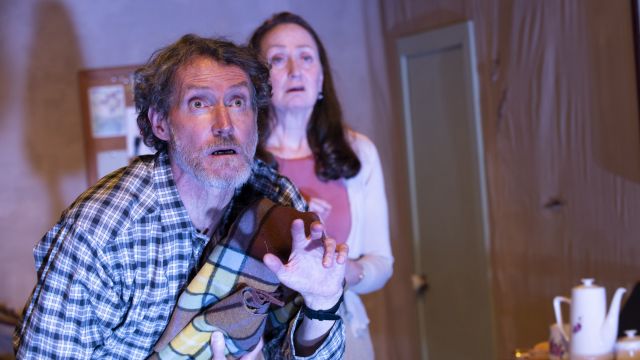The Cane
The cane of the title is that tool of discipline employed by schoolteachers. That bendy stick of cane or bamboo that stung, sometimes bruised, sometimes broke the skin, and left a numb ache. ‘Hold out your hand, boy.’ Or, sometimes, ‘Bend over. Outlawed, according to the play, which is set in Britain, for thirty years, the memory of this corporal punishment lingers on. Thirty years ago, caning was accepted practice. Now it is condemned as sadistic and cruel, as are those who employed it. But in The Cane, the cane itself is both real and a metaphor; it is a means of control, now unacceptable, replaced by other more subtle, more long-lasting and coercive means of control.
Anne (Jessica Clarke), a married woman with three children, comes ‘home’ unannounced to her parents. Her mother, Maureen (Caroline Lee) makes plain that Anne is not welcome and tells her to leave at once. Anne refuses and – as the play proceeds – that reaction from Maureen appears to be forgotten. This is not a ‘naturalistic’ play and the actors to do not play it as if it is. (Perhaps they should.) Anne brings a birthday card made by her children for her father, Edward (Dion Mills), Deputy Head of the local school. We suspect that Edward scarcely knows his grandchildren and that Anne is lying about their wish to see him.
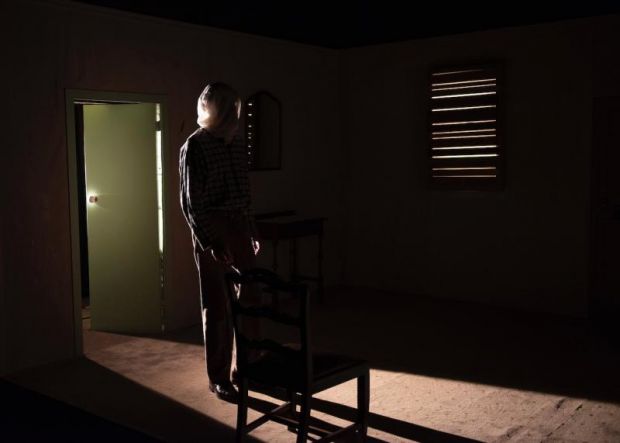
Edward is upstairs, writing a positive report on his school in the face of its very possible conversion to an ‘Academy’ school -i.e., still state funded but more autonomous. It’s a program designed to take over ‘failing schools’ and produce more of what we here would call ‘job ready’ graduates. Australian audiences may not be aware of the nature of Academy schools, but director Kirsten von Bibra provides an explanation in the program. From what I have read, the authoritarian mindset and goal- oriented methods of Academy schools seem close to a rigid Gradgrindery, replete with positivist slogan brainwashing. We learn something of these schools’ methods from Anne, who turns out to be not just an agent but an important decision maker for them.
When Anne notices a boarded-up window, Maureen reluctantly tells her somebody threw a brick through it… as a growing mob of schoolkids besiege the house. It emerges that the past has caught up with Edward: he is – or was – a teacher who used the cane – albeit thirty years previously – and there is proof: a register of the caned boys and the teachers who did the caning. We infer that Edward is not a bad man, not a sadist but a reluctant caner: there had to be punishment for, say, the destruction of school property…
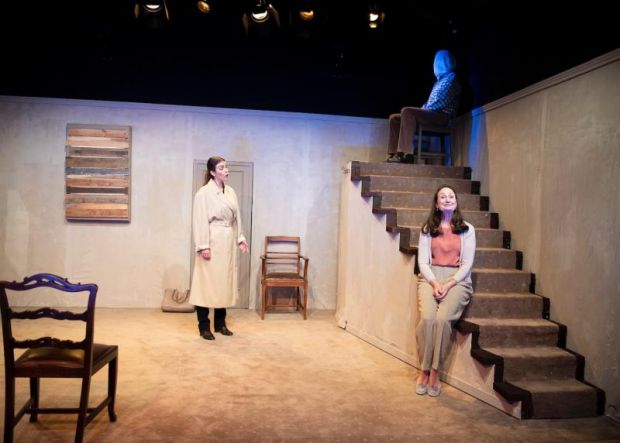
Thus is introduced the theme of retrospective moral judgement (very popular at present): but should we, can we judge the past by the standards of the present? As for control, isn’t there clearly a need for it, given the brick throwing schoolboys outside? Far more intriguing, we learn of the time Anne, as a child and in a furious rage, threatened her parents with an axe. The marks of that incident are still on the living room wall and the axe is still under the stairs. And now Anne is a grown-up, but she reveals, or drags from the past, an irrational masochism – another switcheroo – and, it even seems, she has come to rescue her father.
But The Cane is a play of ideas. As a family drama, it is cold, but it is not intended as a family drama. The dynamic of this family is that each is an exponent of a position – which does not preclude a change of position. Anne is manipulative and ambiguous. Maureen is an utterly conventional woman who lives in fear and so can minimise or rationalise anything. Edward begins the play motionless in a chair at the top of a staircase, his head covered in a white cloth; he is overwhelmed and bewildered by the, to him, sudden shifts in values, educational practices, and the horrible realisation that he will not be celebrated at his imminent retirement.
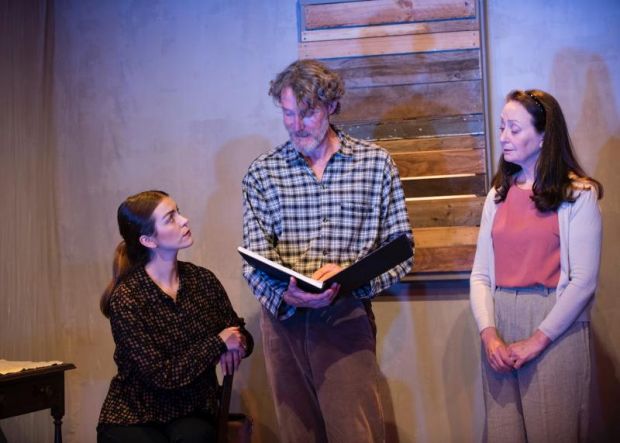
Intellectually – and leaving aside conventional consistency - what these shifting and clashing attitudes and memories reveal is timely and challenging. But playwright Mark Ravenhill seems to me – at least in this production – more interested in the ideas, the contradictions, and the ambiguities, and in teasing them out, than he is in his characters. And yet he is one of the most performed playwrights in Britain.
Kirsten von Bibra has extensive prestigious credits so we can be sure her decisions are thought-out and deliberate – and yet it seems that for her too, the ideas take precedence over drama. Here we have an excellent cast, but their delivery of the already mannered dialogue is pronounced and emphatic from the beginning, leaving them with nowhere to build to – as the threats outside and inside escalate. Obviously, it’s in the nature of the text, but the long, convoluted speeches from one or other of the characters, particularly Edward, leave the others hanging about, flat footed. They seem rather stranded in Lara Week’s no doubt deliberately drab living room set, with its sparse furniture (no books, no pictures), its stained and fading wallpaper and a staircase to the floor above. But from what the characters say, Ms Weeks has followed what’s in the text.
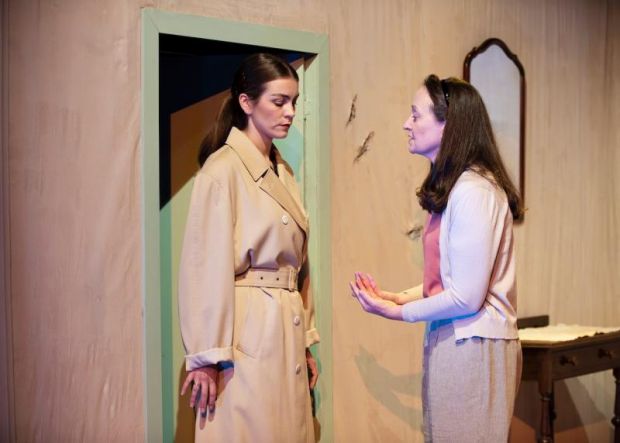
Mr Ravenhill is not the first provocateur to present a play of ideas. Brecht did it and Shaw did it over and over again – and very recently Anchuli Felicia King did it with her The Golden Shield. Perhaps we are intellectually lazy, but at an hour and forty-five minutes, The Cane feels repetitious and much longer than it needs to be. We ‘get’ the point, and we would get it with more force if it had been remembered that ‘less is more’.
Michael Brindley
Photographer: Jodie Hutchinson
Subscribe to our E-Newsletter, buy our latest print edition or find a Performing Arts book at Book Nook.

